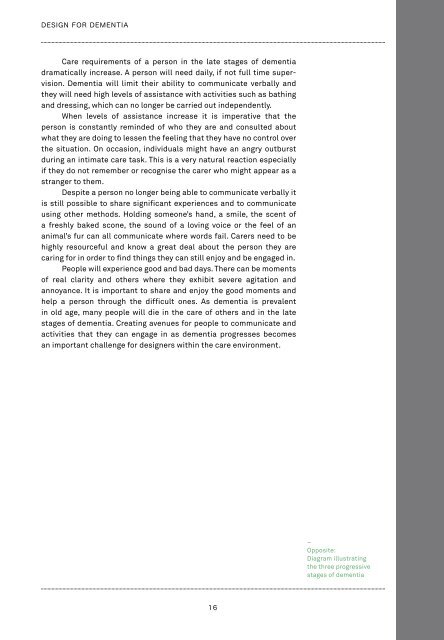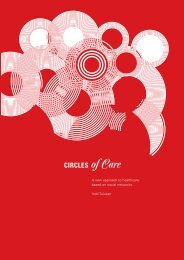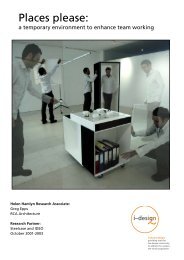Design for Dementia - Helen Hamlyn Centre - Royal College of Art
Design for Dementia - Helen Hamlyn Centre - Royal College of Art
Design for Dementia - Helen Hamlyn Centre - Royal College of Art
You also want an ePaper? Increase the reach of your titles
YUMPU automatically turns print PDFs into web optimized ePapers that Google loves.
DESIGN FOR DEMENTIA<br />
CONTEXT<br />
Care requirements <strong>of</strong> a person in the late stages <strong>of</strong> dementia<br />
dramatically increase. A person will need daily, if not full time supervision.<br />
<strong>Dementia</strong> will limit their ability to communicate verbally and<br />
they will need high levels <strong>of</strong> assistance with activities such as bathing<br />
and dressing, which can no longer be carried out independently.<br />
When levels <strong>of</strong> assistance increase it is imperative that the<br />
person is constantly reminded <strong>of</strong> who they are and consulted about<br />
what they are doing to lessen the feeling that they have no control over<br />
the situation. On occasion, individuals might have an angry outburst<br />
during an intimate care task. This is a very natural reaction especially<br />
if they do not remember or recognise the carer who might appear as a<br />
stranger to them.<br />
Despite a person no longer being able to communicate verbally it<br />
is still possible to share significant experiences and to communicate<br />
using other methods. Holding someone’s hand, a smile, the scent <strong>of</strong><br />
a freshly baked scone, the sound <strong>of</strong> a loving voice or the feel <strong>of</strong> an<br />
animal’s fur can all communicate where words fail. Carers need to be<br />
highly resourceful and know a great deal about the person they are<br />
caring <strong>for</strong> in order to find things they can still enjoy and be engaged in.<br />
People will experience good and bad days. There can be moments<br />
<strong>of</strong> real clarity and others where they exhibit severe agitation and<br />
annoyance. It is important to share and enjoy the good moments and<br />
help a person through the difficult ones. As dementia is prevalent<br />
in old age, many people will die in the care <strong>of</strong> others and in the late<br />
stages <strong>of</strong> dementia. Creating avenues <strong>for</strong> people to communicate and<br />
activities that they can engage in as dementia progresses becomes<br />
an important challenge <strong>for</strong> designers within the care environment.<br />
EARLY<br />
Difficulties with<br />
recent memory<br />
and <strong>for</strong>getfulness<br />
Anxiety and depression<br />
<strong>of</strong>ten occur<br />
Loss <strong>of</strong> concentration<br />
Disguising difficulties<br />
may be successful <strong>for</strong><br />
some <strong>of</strong> the time<br />
MID<br />
Impaired ability <strong>for</strong><br />
activities <strong>of</strong> daily living<br />
such as dressing,<br />
eating or shopping<br />
Significant memory<br />
lapses such as not<br />
recognising a person<br />
they know well<br />
Challenging behaviour<br />
and social disinhibition<br />
may be experienced<br />
Sleep disorders<br />
are common<br />
LATE<br />
Reduced capacity<br />
to reason or make<br />
decisions<br />
Significant<br />
communication<br />
difficulties, including<br />
fragmented speech<br />
Immobility, rigidity<br />
and recurrent falls<br />
Physical deterioration<br />
and difficulties with<br />
eating result in<br />
progressive physical<br />
weakening<br />
–<br />
Opposite:<br />
Diagram illustrating<br />
the three progressive<br />
stages <strong>of</strong> dementia<br />
16<br />
17

















